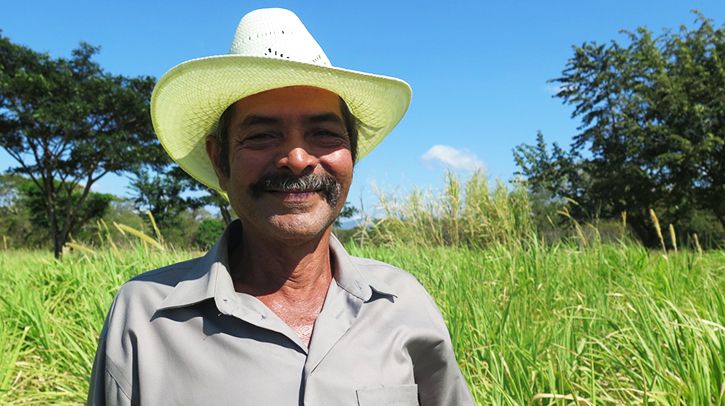Earth Day 2019 | Expanding a Culture of Resilience

Episcopal Relief & Development and its partner organizations across the globe are working with vulnerable communities to build resilience to a rapidly changing climate. One way we are doing this is by supporting farmers with the information, technology and networks they need to thrive in increasingly resource scarce contexts.
As we celebrate Earth Day, take a look at how Nicaraguan farmers are transforming their livelihoods.
Nicaragua is a country with diverse landscapes and climate, ranging from the drought-ridden Dry Corridor in the western part of the country to flood-prone zones along the Caribbean coast. A combination of a rapidly changing climate, diminishing forest and coastal ecosystems—which serve as natural defenses to extreme weather—has exacerbated droughts, floods, and overall climate variability throughout the country. Agriculture is the cornerstone of the local economy for the rural areas of Nicaragua. But with increased drought and flooding, farmers cannot rely on traditional farming practices.

Farmers show the fruits (or veggies) of their labor.
For the better part of the decade, Episcopal Relief & Development has partnered with the Council of Protestant Churches of Nicaragua (CEPAD) to help farmers strengthen their enterprise and build resilience to increasing climatic extremes and variability. CEPAD has facilitated a successful climate smart agricultural training program where 144 farmers in six communities were educated on the best methods to withstand harsh climate conditions, such as drought and flooding. This number continues to grow impacting thousands. The farmers learned agriculture management techniques, including how to make micro-dams and irrigation ditches to conserve water and soil. They also learned about the benefits of diversifying their crops, such as improved soil fertility and household nutrition.
 Juana (left) with Isidra Urbina, Field Office Manager, CEPAD.
Juana (left) with Isidra Urbina, Field Office Manager, CEPAD.
In addition, CEPAD’s programs have helped farmers organize into cooperatives, providing training on record-keeping and developing marketing plans and business models. Juana, a farmer and president of a local co-op, believes the program and the fruits of her labor “have helped us with our family’s diet as well as for commerce.” Juana’s crops grew abundantly that she quickly transitioned from selling from the local market to the central market, and eventually tofounding a cooperative with members of her community.
 Farmers happily share success stories learned from CEPAD’s climate smart agriculture program.
Farmers happily share success stories learned from CEPAD’s climate smart agriculture program.
The program has also transcended and inspired community and leadership development. Farmers who have seen the success of their new farming practices are encouraged to train their neighbors, ensuring that all community members have livelihoods that are productive and sustainable.
“It is important to note that we train them not just in theory but in practice,” said Joel Rodriquez, Manager, CEPAD Field Office. “The farmers then train others in the community . . . becoming a leader through knowledge-sharing with other families.” The program not only improves the family’s lifestyle, but that of the community’s.
Another important element of the program is the family’s participation. Experimenting with new methods takes time—sometimes years—and with the help family, young and old. But program officers and community members have all seen the process be transformative, empowering and rewarding. “When we planted our seeds, she [granddaughter] was not even born yet,” said Francisco, another local farmer. “Now she asks to go to the farm every day.”

Fernando (right) explains how his granddaughter looks forward to visiting the farm on a daily basis.
More importantly, CEPAD and its program members have kept scripture close to the heart. As a result of the program, the farmer enjoys a more productive plot of land, providing them with better food, serving as a training ground for other farmers or “disciples” and serving as a reference point for other organizations. Rodriguez adds, “God gave us land to conserve, protect, farm and harvest it. Biblical Scripture is very important to us. It is our main tool—our ‘machete’. We trust in God that everything will work out for us.”
Watch how farmers in Nicaragua have learned to become more resilient.
Expanding a Culture of Resilience in Nicaragua from Episcopal Relief & Development on Vimeo.


